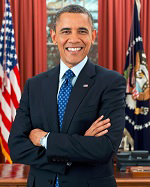 |
| President Barack Obama |
President Barack Obama's plot to bolster personalized medicine research would lean heavily on a planned bank of patient genetic information, Science magazine reports, pooling existing databases to create a huge R&D utility. But the promise of a so-called Precision Medicine Initiative has left some scientists cold, hearkening back to overblown efforts past.
Citing scientists familiar with the initiative, Science's Jocelyn Kaiser reports that Obama's plan involves gathering medical records and genomic data on as many as 1 million Americans and using the resulting databank in studies designed to ferret out the underlying biological causes of disease. Instead of setting out to sequence the genomes of thousands, as the U.K.'s National Health Service is out to do, Obama wants to combine a slew of federally funded registries into one huge biobank, according to Science.
The president first hinted at the effort in last week's State of the Union address, urging "the country that eliminated polio and mapped the human genome to lead a new era of medicine ... to bring us closer to curing diseases like cancer and diabetes -- and to give all of us access to the personalized information we need to keep ourselves and our families healthier."
Obama is expected to divulge further details on the Precision Medicine Initiative on Friday. And, as CNBC's Meg Tirrell first reported, the president wants biopharma to take part in the discussion, inviting the top researchers from Merck ($MRK), Regeneron ($REGN) and Vertex ($VRTX) to attend an unveiling event at the White House. As for what the initiative might cost, Obama is likely saving that information for the Feb. 2 presentation of his fiscal 2016 budget request.
The guiding principle behind Obama's plan--and personalized medicine in general--is that a greater understanding of the many genetic variants that dictate human biology will help researchers more easily diagnose and treat disease. But anyone expecting an R&D panacea is surely to be disappointed, Mayo Clinic physician Michael Joyner wrote in The New York Times. While the field has spurred some major successes in rare diseases, most trips down the genomic road lead to more questions than answers, according to Joyner, especially in the presidentially name-checked fields of diabetes and cancer.
"Like most 'moonshot' medical research initiatives, precision medicine is likely to fall short of expectations," he wrote. "Medical problems and their underlying biology are not linear engineering exercises, and solving them is more than a matter of vision, money and will."
But the potential of a huge, cross-cutting databank is not to be dismissed, other scientists say. The heretofore limits of personalized medicine are in part the result of disparate researchers working in silos, according to proponents of the program. Combining resources could help those scientists spotlight unseen avenues of biology, University of California, San Francisco, Vice Chancellor Keith Yamamoto told Science.
"It's a giant integration mill from which stuff would fall out from the bottom as new knowledge," he said.
- read the Science story
- here's CNBC's scoop
- check out Joyner's editorial